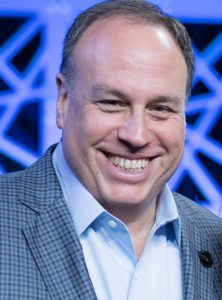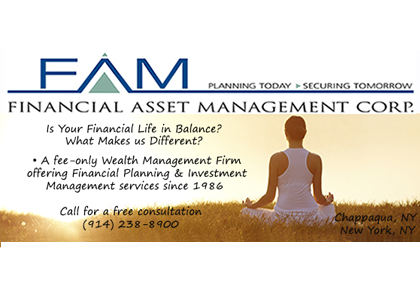Scott Kahan The Truth About 529 Saving Plans For College

Scott Kahan The Truth About 529 Saving Plans For College: Chappaqua’s Scott Kahan serves up everything you need to know about 529 plans. And what not to do to save for college. Scott is a Certified Financial Planner and President of Financial Asset Management Corp, in New York City and Chappaqua.
 When should you start saving for college?
When should you start saving for college?
The day your child is born and you get a social security number. Considering the cost of a private college at sixty to seventy thousand dollars per year, the sooner you start the better.
How should a college savings plan fit in with an overall financial plan?
Saving for college should be part of your overall financial planning. We discuss the clients overall goals including retirement, buying a new house, college etc. We then look at how much they need to save each month. If the resources are there we look to make monthly contributions into all their savings and investment accounts with one caveat. Remember you can always borrow for college but you can’t borrow for retirement.
What’s the best way to start saving for college?
The best and easiest way is with a 529 College Savings program. Your investments grow tax-free. Withdrawals are also tax-free as long as they are used for “qualified” college expenses. Contributions to the New York 529 College Savings Program (NY’s 529) are also state tax deductible up to $5,000 a for a single parent, $10,000 if you are married. This is a total amount no matter how much you put in for one or more children.
Most parents will take out separate plans for each child. However you can withdraw money from either plan to pay any college costs. If you have money left over in one plan, you can use it for the other child.
What are the investment options in a 529 plan?
 There are two versions of NY’s 529. We recommend the direct version to avoid commissions or sales charges. All investment options in the direct version are Vanguard funds. And you have complete flexibility within them to customize your portfolio.
There are two versions of NY’s 529. We recommend the direct version to avoid commissions or sales charges. All investment options in the direct version are Vanguard funds. And you have complete flexibility within them to customize your portfolio.
The easiest way to invest in NY’s 529 is with an age-based portfolio. As your child ages, these portfolios gradually restructure to become more conservative. As with any investment, the sooner you need the money, the less risk you want to take. You can choose a conservative, moderate or aggressive plan. Whatever investment style you choose, the funds will be allocated across a pre-selected mix of Vanguard funds offered within the plans.
What are ”qualified” college expenses?
All tuition, room and board costs are qualified. If your child moves off campus you can use it for rent up to the equivalent cost of living on campus. Books and supplies are qualified. As are technology items. Including computers, laptops, printers, and even software that is required for school.
529 withdrawals can also be used for private schools K-12. If you overfund your account, let’s say your child gets a scholarship; you will have to pay taxes on the withdrawals. In some cases, withdrawals not used for college costs could be subject to pay an additional 10% penalty. Or you can use the money for your own education. That includes continuing education classes.
How much of the cost of college should parents expect to save in a 529 plan?

That is often a philosophical issue that we always discuss with our clients. Do you plan to fully fund college? Or do you want your child to have some skin in the game. Some parents, perhaps because they had to pay some of their college costs, want their child to bear some of the responsibility. Parents who have the resources often commit to paying for undergraduate school but expect the child to fund graduate school through loans.
How does a 529 plan effect financial aid?
If the parent owns the 529 account, it is considered a parent asset by FAFSA and CSS. So your expected family contribution (EFC) against those funds will be 5.64% compared to 20% if it is a child’s account. If a parent has another custodial account that is in the child’s name, schools will take 20% on that each year. For this reason, custodial accounts are not a good way to save for college.
Relatives can also open 529 accounts for your children. A relative’s 529 plan for a child is not counted as an asset against EFC. But when they begin withdrawing the distribution it is considered the child’s income. That will affect EFC. So, we advise our clients to use money from a relative’s 529 for the final year of college. That way the money won’t fall into any tax year reported into FAFSA or CSS. And it won’t raise EFC. Alternatively, have them contribute to your 529 plan if they want to help with college saving.

In the event that a relative has already opened a custodial account for your child, they can move it to a custodial 529 plan. They will get the state tax deduction if they continue to fund the account and they won’t have to pay taxes when they sell an asset to make an educational payment. The best scenario for a custodial account that is not a 529 plan is to use the money for college prep costs. Including test prep, essay writing assistance and other college counseling costs. Just remember that the parents 529 plan cannot be used for college prep costs.,
When is it too late to start saving in a 529 plan? Never. You can still contribute to a 529 for the tax-free growth and the state tax deduction even if your child is already in college. If you need to pay tuition right away there are still benefits to paying into a 529 plan first. You can literally contribute to the plan in August and pay tuition in September and you will still get the state tax deduction for that year. So if you put away $10,000 you could save as much as $880 based on your tax bracket.
Financial Asset Management Corporation has provided fee-only financial planning and wealth management services for individuals and small businesses in the Tri-State area since 1986. They serve 150 clients and manage over 200 million dollars in assets. FAM Corp. President Scott Kahan is a Certified Financial Planner professional. (Financial Asset Management Corp., 26 South Greeley Avenue, Chappaqua, NY, (914) 238-8900; www.famcorporation.com)
















